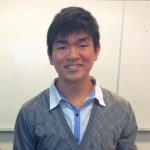Hometown in Japan: Tokyo
Home University: Tokyo Institute of Technology, Faculty of Life Science and Technology, Bioscience and Biotechnology
B3: Junior, Expected Graduation Date: March 2020
Host Lab at Rice University: Angel Martí Group
Host Professor: Prof. Angel Martí, Depts. of Chemistry, Bioengineering, and Materials Science & NanoEngineering
Final Research Poster (PDF): “Amyloid-βaggregation affected by Oxidized Aβ”
Why Nakatani RIES?
Through this program, I hope to be able to understand biotechnology, my major, more broadly and deeply. In my university life in Tokyo, it is sometimes difficult for me to imagine how the biological theories and phenomena I learn in classes contribute to our real life. However, through hands-on research at Rice University, I will engage in situations where these academic subjects are applied to the frontier of research. This inspiration will enable me to capture my field of study from different perspectives, leading to a better understanding of life.
Furthermore, I will acquire practical skills that I will need to be able to work as a researcher. During the program, I will participate in a series of research processes from planning to poster design and presentation, and I will be using English all of the time. These methods and communication styles we learn in through these practical activities are the foundation needed to work in academia. These skills will not only help me perform well in my academic research starting in my senior year at the University of Tokyo, but also enable me to compete in the international sphere in the future.
- Acquiring fundamental skills as a researcher: planning and conducting experiments, discussion, and presentation.
- Visiting many places in Houston, such as sightseeing places, other laboratories, and organizations.
- Acquiring skills to live by myself in an unfamiliar environment.
- Learning academic English for my future research career.
- Feeling the culture of meritocracy in the U.S.
Reflections on Program
- My favorite experience in the U.S. was … visiting a church in Houston where I could see the cultural and religious aspect of the U.S.
- Before I left for U.S. I wish I had … interacted with professors in Japan whose research topics were similar to those of my host lab in the U.S.
- While I was in the U.S. I wish I had … visited more laboratories in Rice University and learned what are researched.
Excerpts from Ryotaro’s Weekly Reports
- Week 01: Arrival in the U.S.
- Week 02: First Week in My Research Lab at Rice
- Week 03: Interview with U.S. Student and Researcher
- Week 04: Reflections on English Language & Life in the U.S.
- Week 05: Final Week at Rice and Research in the U.S. vs. Research in Japan
- Research Project Overview and Poster
- Week 06: Last Week in the U.S.
- Final Report
- Tips for Future Participants
Week 01: Arrival in the U.S.
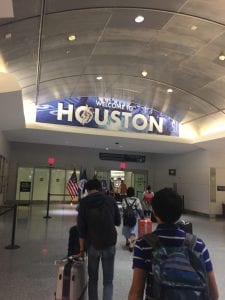
Before departure for the U.S., I took steps to prepare to live by myself with the least trouble possible while in the U.S. Because I had heard we had to cook by ourselves during our stay, I practiced cooking several dishes. Also, I brought daily necessaries which I use in Japan to the U.S. Since I was able to use the shampoo and face wash I am familiar with from home, I could spend the first week without any difficulties. As advice to future participants, I would like to recommend you bring Japanese seasonings. If you prepare them, you will not have to spend as much money on purchasing many seasonings in the U.S., and you can enjoy a Japanese taste even after leave Japan. Also, I suggest you to bring or buy Tupperware. It can used not only for preservation of food, but also for lunch boxes. You can purchase inexpensive Gladware at the grocery store or Target or Wal-Mart (like AEON) in the U.S.
It was impressive to me that everything in Houston was large compared to Japan. The seats of buses were so large that we could easily relax on them. Also, since the bulk of the food at super markets was very big, we had to consider how long it would take to consume the food we bought. Above all, Houston has a lot of flat land inside and outside of Rice University, and we had to consider to use public transportation or Uber/Lyft to get wherever we went.
I was surprised at the friendliness of people in the U.S. Whenever I met someone I didn’t know in an elevator, they began conversation with me. Since it is not common in Japan to talk to unfamiliar people, I was a little nervous about this. However, as I get used to American small talk, and I enjoyed these conversation with everyone I met. Before I came to the U.S., I had heard that U.S. people are open minded. However, the friendliness was beyond my expectation.
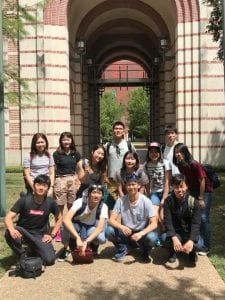
Among the lectures during the orientation program, the most helpful one was the one by Dr. Ozaki on Tips for Using/Speaking in English. In the past, I had anxiety that I would not be able to communicate with others because of my poor pronunciation in English. Through this lecture, I learned some tips to make communication smoother. Since then, I have tried to make use of the tips in my lab.Through the campus tour, I was able to explore the Rice University campus. The most impressive point was the size of the campus. Since the campus was several times as large as my home university, it was difficult to explore all the facilities in the campus. My favorite facility was the library. In addition to books and comfortable desks, there are many historical artifacts. I thought I could spend all day in this building. I also found the lecture by Dr. Gayle Moran very helpful too. The topic of the lecture was how to design a research poster. In her lecture, she used many examples of posters to explain the important factors and things to avoid when making a research poster. Since I have not made a research poster before, I thought that these tips would be helpful things to keep in mind during my research internship at Rice University. In the evening after doing research in my lab, I went to the Rice University gym. The facility has plenty of equipment for training, two swimming pools, table tennis, and so on. We could enjoy several sports at the same time. Exercising enabled me to refresh my tired body after working in the laboratory.
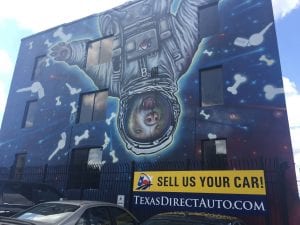
We also visited two grocery stores to buy commodities and food ingredients during the first week. The first one was Randall’s. In this store, there were many kinds of ingredients and the sizes of packages were so large that we had to carefully consider how much we should buy. The second store was the Super H Mart. I was surprised that there were many Japanese foods in the store, like seasonings and instant foods. We bought a rice cooker and enjoyed rice, a Japanese staple food, at the hotel. Through the mural tour on Saturday, we got to see many paintings on the walls. In addition to some art museums in Houston area, murals on the walls of ordinary buildings functioned as an artistic factors in the city. From this tour, I learned that the city of Houston itself is an unique art work. Around the noon, we visited a food festival in downtown Houston. Artists played music and the visitors were excited. There, we enjoyed foods from the various the stalls. The size of the foods was larger than my expectation, and I become full after I ate only one plate of nachos.
On Sunday evening, we went to Buffalo Bayou Park. In the tour, we entered the Cistern, which was previously used as a drinking water reservoir in the past. During our first tour of the cistern, we saw a digital art exhibition that was a projection of strange stripe patterns on everything in the cistern. In the second tour of the cistern, we listened to the history of the reservoir, which enabled us to see the important components of Houston’s historic water infrastructure. After the cistern tours, we walked to the Waugh Drive Bridge where bats appeared in the evening. The darker it got, the more bats came flying out from under the bridge. I think this was very rare opportunity because I cannot see wild bats around my home town. In my free time, I visited the Houston Museum of Natural Science. There I saw a lot of beautiful samples and photographs which include wild life in Texas. My favorite exhibition was the one of the ancient civilization of Egypt. As I went through the gate, I saw many mysterious objects such as real mummies. If I had more free time, I think I could spend almost all the day there.
Reflections on Intercultural Experiences
As I have spent time in Houston, I have felt some cultural difference in many situations. Generally speaking, the U.S is a country of individualism, in which the subject of the decision is individual person. On the other hand, Japanese culture is based on collectivism, in which many people make decision as a community. It is difficult to mention whether one culture is good or bad, but the difference in our cultures often teaches us useful lessons. In the U.S., human relations are based on equality. Students talk to professors without feeling there is a large gap in the hierarchy or position between them. Also in my host laboratory, students discuss their research topics with the professor and sometimes have seen students object to what the professor presented to them. The U.S. is famous for placing a high value on efficiency. Even though your effort may not be seen by other people, this does not matter if the result is excellent. Actually in my laboratory, most of the members never stay in the lab until late at night. However, I found that they finish their tasks without fail. Even if they do not stay in the lab for a long time, they made sure to work efficiently to complete their tasks.
In comparison, Japan is a country of harmony and diligence and has a different culture. Whenever my behaviors are not understood by the U.S. people, I felt that my cultural background was completely different from them. In the first week, I believed that the priority was to show my effort to my mentor. I thought diligent people are rewarded in any situation. However, as time passed, I noticed that it is not so important whether I show my effort or not. Even though the task the mentor gave to me was not difficult and I could complete it without a lot of effort, my mentor praised me so much. On the other hand, the appearance of diligence does not always work well. When I was asked a difficult question, I was trying to make myself look like I was thinking seriously. I thought that the attitude to tackle the task is important for students. However, it seemed that my mentor did not notice the purpose of my behavior and just shifted to the next question. From this experience, I noticed my behavior which is characteristic for Japanese but maybe strange for U.S. people. Japanese people tend to value the process to reach the goal, but American people often values the results in spite of what pathway we take.
Preparing for Research and Initial Days in the Lab
Before I came to the U.S., I read some academic papers that my mentor had sent to me. Since there were several words and theories I am not familiar with, I wrote down these points to ask my mentor after arrival. I think it was good that at my home university library I was able to borrow textbooks related to the topic I will study in the U.S. Since there are not many documents written in Japanese, these books I brought helped me understand my laboratory. I recommend to future participants to ask advice from professors in Japan who are familiar with your topic at your home university. Even though I didn’t do this, I believe that if I had they would have been able to give me tips about what you should prepare and what kinds of books you should bring.
During my stay in Houston, I will do research in the Marti Group, the Department of Chemistry. The Principal Investigator (PI) of the lab is Prof. Angel Marti. In his lab, there are mainly three research projects: analytical chemistry by spectroscopy, probing protein aggregation, and material science. I chose this lab as my host lab because I was interested in the structural analysis of mutant proteins that can cause illness. My mentor is Bo Jiang, a 4th year Ph.D student. He finished his undergraduate course in China and is pursuing his Ph.D at Rice University. Since we met at the welcome party, he has been so kind to me, answering all my questions about both daily life and the research topic.
On my first day in the lab, I listened to my mentor’s explanation about my goal during this internship. My research topic is to study Amyloid beta, a protein molecule which is said to cause Alzheimer’s disease. The monomer proteins congregate to be fibrils, which is toxic to human body. From previous experiments, the research group had hypothesized that small amounts of oxidized Amyloid beta can prevent the fibrillization of other molecules of Amyloid beta. My task is to prove the hypothesis. Before arrival, I read papers related to the topic, which enabled me to determine which points I couldn’t understand. Through the discussion with my mentor, I could solve unclear points I had before.
In the first week in the lab, most of what I could do was to observe what my mentor was doing. I spent a long time to prepare the proteins of samples I will use from next week. I took notes of whatever he said about experiment. As time passed, he allowed me to use device to purify the samples. It took a bit of time to get used to manipulating the device, but I tried to use it smoothly by myself.
In the lab, we do not do computer simulations, only chemical experiments. Therefore, in the first week, it was important for me to observe mentor manipulating the equipment and understand the mechanisms. There were many things I had to remember, but there was nothing I had to think of by myself. Thus, in the first week I did not feel that I did “research”. From next week, I hope I can create experimental plan and proceed with it by myself. Also, I learned that I should learn to make good use of my time in the lab. Since there happens to be waiting times for analysis experiments and chemical synthesis, I had some free time during research time. During my free time, I reviewed my notes to check how much I understood the research topic and wrote down questions I would like to ask of my mentor.
One evening after work in my lab, I joined the Happy Hour, a monthly party of the Chemsitry department. There, I enjoyed a lot of Tex-Mex food and drinks. I enjoyed conversation with the members of my host lab and other chemistry laboratories. I found it was a very good experience because I could listen to not only the chemistry research topics, but also learn about ways to make my life in Houston better. One of the most impressive things about the host lab was the lifestyle of the lab members. Many of the graduate students were married and some of them had children. I reflected on the fact that graduating students in the U.S. are independent, both economically and living independently, compared to graduate students in Japan.
Question of the Week
Compared to Japan, most of the foods in the U.S. have very strong tastes and is very fatty. Why American foods are those of high calories?
- Food/cuisine is different everywhere in the world. Japan is known for, overall, having a very healthy national cuisine compared to other countries due to the small amounts of red meat and lots of fish and vegetables that are typically consumed. The high life expectancy in Japan has also been linked to the healthy Japanese diet. No matter where you go in the world you will likely find that most national cuisines are less healthy than the typical Japanese diet.
- Geography influences diet too. Since there isn’t a lot of open land for cattle/livestock in Japan, it makes sense that, historically, most protein in Japan would come from the abundant sea. That is compared to the U.S. which has lots of wide open land for growing crops and raising cattle/livestock. Also, much of the U.S. is land-locked so doesn’t have easy access to protein from fish or the sea. U.S. cuisine is strongly influenced by our history of European immigration which also has a more fatty/heavier cuisine than Japan.
- There are lots of articles that ask this same question in reverse, why is the Japanese diet so healthy? This is also why, to keep good health and save money, most Americans will cook at home on their own as food in restaurants is almost always going to be more fatty/heavy/high calorie than what you cook at home. This is also true in Japan. If you eat konbini food, Yoshinoya, or fast food for most/every meal you might also wonder if all food in Japan is unhealthy but when you cook at home you can eat a lot more healthy in Japan.
- Why is the Japanese Diet so Healthy? (BBC)
- How to Eat Like a Japanese Person (Time)
- Diets of the World: The Japanese Diet (Web MD)
- See also the section on ‘Staying Healthy When Eating Out’ on the Food in the U.S. page.
Week 02: First Week in My Research Lab at Rice
As I spend more time in the Marti lab, I’ve gotten used to the laboratory life. Every day, I am working with my mentor, Bo Jiang. He is now a 4th year Ph.D student. He is married now and lives near the university. His research topic focuses on a protein called Amyloid beta, which is said to cause Alzheimer’s disease. He is trusted by all the lab members and everyone always asks him for advice. I believe that he could be a researcher or professor, but he said that he would work in industry after graduation.
The Marti laboratory consists of the professor’s room, the students’ room, and the experimental space. The laboratory is located near the student center, and has easy access to the campus store and the gym. Compared to newer facilities like the Bioscience Research Collaborative (BRC), the equipment in the lab is relatively old. However, the lab has some unique equipment too and sometimes researchers from other labs come to use it. Since this lab uses organic chemicals, the experimental space also has a strong smell of chemical. Also, whenever I do experiments, I have to put on protective wear, gloves, and goggles.
Before I joined this laboratory, I thought I could communicate in English to a certain extent. Actually, it was not difficult to chat with the lab members about everyday topics. However, I found that my academic English skills were different from that of general chatting. There are a lot of academic words related to the research in English that I don’t know. Sometimes I could not understand the words my mentor mentioned and I had to ask him to repeat them again. Whenever I had unclear points, I had to ask him my questions. However, asking questions itself was hard for me. In order to do it, I had to make sure of the points I did understand at that time. Also, it was necessary to connect technical terms to explain the methodology to my mentor. Since I was exposed to the broad gap between technical English and general English, I was very tired every day after completing my research.
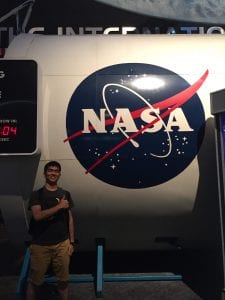
One morning, I tried to run around Rice University campus. Before running, I thought I could finish it without stopping. However, because the campus was larger than I expected and I mistook the pace of running, and I had to stop in the middle of the way. Since it was for the first time in years to run, I got very tired. However, I found that environment around Rice University was good for running for its flat land and plenty of green space. I think I would like to try to run again.
On Saturday, we visited NASA. There, we could see a lot of memorials and relics related to the development of American aerospace industry. In the tour of astronaut training facility, I found a lot of equipment I had not seen before. The displays of the rockets were bigger than I expected, which impressed me as one of the developed aspect of the U.S. On Sunday morning, I visited a church with my friend whom I met at a Rice University. event There, I met Prof. James M Tour who is a chemistry professor. However, not only that, but he made speech about Christianity in front of the audience. I was surprised by the wide variety of his knowledge.
Question of the Week
I’ve heard that the U.S. is a country of individualism. However, I found many people wearing Rice University T-shirt in the campus. Even if they value individual, do they also strong identity as a part of community?
- Yes, group identity is still important in the U.S., particularly when it comes to your university or ‘school pride’. But this relates back to individualism too, since U.S. high school students apply to many different schools and ultimately choose the school that they think will be the ‘best fit’ for them from among (usually) the two or three different schools that they were accepted into. In a sense they are displaying which type of community/school they chose individually to join. So, both individual identity and group identity re-enforce each other in the U.S. For more about applying to college in the U.S., see our Education in the U.S. page.
- This is a bit different than in Japan where admission to university (and graduate school) is primarily exam based.
- Group identity in the U.S. shifts a lot though and people may join and leave many different groups over their lifetime. However, when it comes to what university you went to (or even high school) ‘school pride’ is something that never goes away entirely and you’ll find many adults wearing university t-shirts or sweatshirts too long after they graduated from college or high school.
Research Project Update
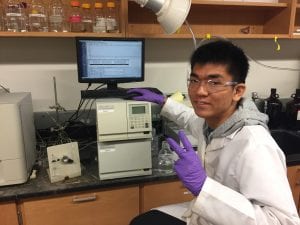
My research topic at Rice University is to investigate a protein called Amyloid beta. This protein is at first a monomer, but it congregates with other monomers to be oligomers, and finally they become fibrils, which can cause Alzheimer’s disease. Through previous research, there is a hypothesis that oxidized amyloid monomer can prevent other Amyloid monomers from oligomerization. What I do during my research project is to find the relation between the existence of oxidized Amyloid beta and prevention of oligomerization.
In order to reach this goal, we have to prepare pure protein. Thus, first of all, I purified it by chemical method called HPLC. In the first week, I watched my mentor doing this, but in this week he allowed me to manipulate it myself. After purification of the sample, I dissolved the protein into water. Next I used a Fluorescence meter, a device to determine the wavelength of the light which the protein absorbs. From the data collected from fluorescence meter, I could determine the concentration of the protein in the solution. In order to track the changing features of the protein, I use metal complex chemical. Before I could use it, I have to know the characteristic of the chemical. I detected it through the chemical assay that follows the change of time.
On one day, my mentor was absent, and I had to do all the experiments by myself. At first I was a little nervous, but I followed the process he taught me and listened to the advice of other lab members, and I could finish it without any trouble.
Week 03: Interview with a U.S. Student and Researcher
For my first interview, I spoke with of Erick Flores who is now a 4th year graduate student of in the chemistry department at Rice University. He is working in Prof. Marti’s laboratory too. He is from Chile, and he took his undergraduate degree at the University of Santiago of Chile (USACH). There, he belonged to the Department of Chemistry and did research on the synthesis of organometal chemistry. After graduation, he moved to Houston, Texas to attend Rice University, and now spends his time on synthesis of metal complexes which can be applied as markers of samples like proteins and toxic metal ions.
When I asked him the reason why he decided to major in chemistry, he said that his experience during his high school life was the biggest factor. When he was a high school student, he met one chemistry teacher and Erik was very impressed by his way of teaching. He often visited this teacher’s house and through conversations with this teacher, he became more and more interested in chemistry. Since then, he studied a lot and he could enroll in USACH, one of the most prestigious universities in Chile.
There are three main reasons why he decided to enroll in the graduate course at Rice University. The first reason was his interest in studying abroad. Before he graduated from his university, he had not been abroad before. When he had to decide about his career during his undergraduate life, he was eager to study in America, the biggest country in the world. The second reason was the good reputation of Rice University. Rice University has a lot of good experimental equipment and famous professors. For example, the structure of the fullerene was discovered by chemistry professors of Rice University who won the Nobel Prize for this achievement. He thought he could make big step toward his future career as a chemist at Rice. Finally, he aimed to study at Rice because his host professor in Chile knew Prof. Marti before. From the host professor, he got information about Prof. Marti’s research topics and he got interested in it. For those reasons, he joined Prof. Marti’s lab and now he is working as a professional of chemical synthesis.
He will finish his graduate course in 2019. After he finishes his Ph.D at Rice University, he hopes to work in academia rather than in industry. He thinks that it is ideal for him to do what he likes as his profession. Also, he says if he works on chemistry, he can contribute to issues in the society, such as medicine and environmental issues.
As advice for undergraduate students, he told me three tips. First, we have to find the way to eradicate our frustration. If we are stuck within ourselves, nothing will go smoothly. For this, it is good to have time for ourselves. We should have a hobby to refresh ourselves. In fact, he enjoys playing the guitar in his free time. Second, we should be serious about our own research topics. Sometimes we might be confronted with difficult tasks, but we should not give up. Only by spending energy on the difficulties, can we develop our interests and the skills to overcome adversity. Third, it is necessary to perserver. If we are not diligent, we cannot accomplish anything.
Interview with a Professor
I also visited with Prof. James M. Tour, a professor of organic chemistry who is also a Christian. Today he has more than 20 research topics. One of the biggest ones is his research on graphene, a monolayer carbon material. It is induced from other carbon materials like paper by lasers. He said that there are unlimited ways that graphene can be applied and make contributions to the human society.
Prof. Tour said that he had wanted to be a police officer in his youth. However, he gave up the dream because he was color blind. When he became a university student, he began to study in the chemistry department. At first he was interested in forensic science. However, when he became a sophomore, he took an organic chemistry class for the first time. He found it very interesting because he could manipulate the structure of the micro structure of chemicals. From then, he participated in research in an organic chemistry laboratory and finally became a professional chemist.
In addition to being a chemistry professor, Prof. Tour is also an expert on Christianity. He was born into a Jewish family. Until he entered university, he did not care about religion very much. However, he came across an unforgettable event when he was eighteen. He met a Christian. She said to him “You have sins”. He thought it was not correct. He had never done something illegal or that would be hurtful to others. However, according to the Christian religion, considering this itself was a sin. In order to be released from the sinful world, the existence of Jesus is necessary. They continued to talk more about this, and it became his turning point to become a Christian.
Prof. Tour said that all the Japanese people he has met before were great. Especially, it was one of the most impressive experiences of his life that during his graduate course he studied in the lab of Prof. Eiich Negishi. Even after his graduation, Prof. Tour and his wife sometimes met with Prof. Negishi. He said that Prof. Negishi was a great professor, and it was no surprise that Prof. Negishi received a Nobel prize.
As advice to Japanese undergraduate students, he insisted on the importance of studying English. In my generation, almost all Japanese students begin to study English when we are twelve. However, Chinese students began it when they are six year’s old. It has become the biggest difference in English skills between these countries. Japanese people should recognize this disadvantage and work hard on the acquisition of English skills.
Before Nakatani RIES, I had almost no opportunities to talk with Ph.D students and professors working in universities in America. Therefore, this interview assignment enabled me to learn more about the real aspects of academia. Since I am thinking to proceed into academia, I was happy to know what kind of skills I need to acquire in my university life. After I return to Japan, I would like to have an interview like I had in this week to my host professor in Japan. Through the interview, I hope to find the clear differences between researchers in Japan and those in the U.S.
Research Project Update
This week, I began a new kind of experiment. In this experiment, I followed the changing formation of protein. In order to follow the transition, I had to measure the samples in every forty-five minutes. In the first part, my mentor did almost all processes of the measurement, but later he let me do it by myself.
In my research, I often had to wait for a long time before each experiment finishes. During this down time, my mentor allowed me to do whatever I wanted. However, I wanted to do something related to my research, so I tried to ask him what I could do or proposed what I thought I could do at that time. He didn’t always answer the way I hoped, but sometimes he gave me assignments to write manuals to manipulate the analysis devices I will use in these three weeks. He said that I should be able to explain what I understood. Also, he insisted that I had to understand what I do, like why I set each parameter to the certain number, rather than that I should just be able to remember the whole process itself. I learned that if I understand the purpose of each process, I can apply this knowledge in different situations.
Whenever I learn new things in the lab, I have to understand the mechanism and remember the manipulation process. In order to do this, I had to use several methods in each situation. For example, when we talked in the office, I would take notes by using a note application of iPad. On the other hand, in the laboratory I used paper notebooks because there is a risk that the notes would be exposed to chemicals. In some situations I found it difficult to take notes on what he said, because it is difficult to understand by listening only once. In that case, I made use of my smartphone. I used the voice recorder and movie camera in the lab, which enabled me to review what the mentor said after I came back to the hotel.
I have done all kinds of analysis in this week, but at this point I have not reached the best result. There might be some failures in the process of sample preparation. In the next week, I will do the same kinds of analysis as I did in this week. In order to make a good result, I will be careful about each step of the experiments.
Labor Day Weekend
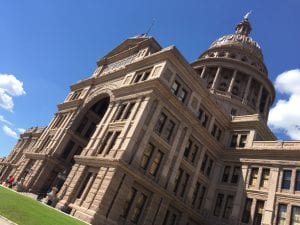
This weekend, I visited Austin and San Antonio over the three-day weekend for Labor Day. In Austin, I first visited University of Texas. Soon after I visited Rice University for the first time, I thought the size of it was so large that sometimes I couldn’t find my way there. However, the University of Texas, Austin was much bigger than Rice University. In order to move around the large land with steep slopes, many people use Lime, a rental electric scooter. Also, I visited the Texas Capitol. The sculpture of the building was elegant. In it, I could see the conference rooms of senators and representatives. In San Antonio, the most impressive thing was the Riverwalk. When I cruised the river, I could see many restaurants and souvenir stores.
- Yes, in comparison with Rice University, the University of Texas, Austin has 40,168 undergraduate students compared to Rice’s 3,970 undergraduates and UT Austin has 11,163 graduate students compared to Rice’s 2,934 graduate students. (2018)
- University of Texas, Austin Facts and Figures
- Rice University: At a Glance
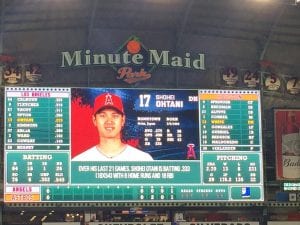
Question of the Week
I learned that most of the Rice University students belong to residential colleges whre they live on campus. However, some of higher grade students and many graduate students are living outside the campus. Why they change their residence during their university life?
- There is limited space in the residential colleges so you are usually only guaranteed to be able to live on campus in your first year of undergraduate study (B1). After that there is an application system and some upper-class students (B2, B3, and B4) students can continue to live on campus but there is not room for everyone. So, starting from your sophomore year, some undergraduate students will need or choose to live off-campus and rent their own apartments. However, they are still a member of that residential college and can eat meals in the college cafeteria, study in the common room, and participate in all the residential college activities and events. Many alumni who return to Rice to visit 10, 20, or 30 years later always first go to visit their residential college as it is their ‘home’ at Rice even if they technically only lived there for 1 or 2 years.
- Graduate students at Rice can choose to apply to rent a room in one of the apartments in the Rice Graduate Apartments or Rice Village Apartments. These are very convenient as they are partially furnished, electricity/water/cable/internet are already set-up and included in the rent, and you can take the free shuttle to/from campus and shopping at the grocery store or Target on Saturdays. So, if you live in the graduate housing you may not need a car in Houston. However, the numbers of apartments are limited and not everyone can get a room in these housing facilities. So many graduate students will live off campus in apartments that they find themselves. If they have a car, they can live a bit further from campus and pay a less expensive rent – but then they have a longer drive.
- We recommend that graduate students in the U.S. always try to live in university graduate housing at least for their first semester. That way, your daily life is easier when you first start a new school and you can have some time to learn about the city, where you want to live, and meet some friends that might want to be your roommate and share the cost of rent/bills if you decide to rent your own apartment off-campus later.
Week 04: Reflections on English Language & Life in the U.S.
Before this program began, I thought I could use English to a certain extent. I could have a general conversation without so much burden, and I had almost no trouble when I went shopping, used public transportation, and used hotel services. Since many of the people around Rice University are kind to me, are willing to talk to me, and repeat things when I ask them to say it again.
In the laboratory, however, I was confronted with my gap in the language. Because my mentor is Chinese, and not a native speaker of English, I thought I would be able to communicate with him relatively easily. However, whenever I said something to the mentor, he would asked me to repeat it again or a question about what I said. There are many reasons that my English was not easy for him to understand, but the biggest was the lack of my knowledge of technical terms and my pronunciation. Before I came to Rice University, I had read academic papers related to the research previously, but I did not practice speaking in English using these terms. Since I did not know how to express the things in the lab in English, I had difficulty in communicating my ideas. Also, I found that my pronunciation was not so good and sometimes it was difficult for the lab members to distinguish the sounds I pronounced. However, all of the lab members understood the lack of my English speaking experience and kindly tried to communicate with me.
One of the hardest things in communicating English was to distinguishing the pronunciation of other students at Rice University. In Japan, I had improved my listening skills by using educational materials with CDs. However, most of them recorded the English of only native speakers. Therefore, I was not used to listening to non-native English, except the English spoken by other Japanese people. One day in the laboratory, a graduate student from China told me “miller sample”. At first I did not understand what he meant, and I tried to find equipment which had a miller. As I asked him to say it again, I found that it was “measure the sample”. In this way I came across many situations where I misinterpreted what I had heard and made an unsuitable decision. From this experience, I learned that it is necessary to have opportunities to talk with people from different backgrounds.
In my stay at Rice University, I found that the most important thing to improve my English was to have as many opportunities to talk about my opinions in English as possible. Even though I was not good at communicating in English, I tried to ask questions to the lecturers frequently. When I asked a question in a lecture and a professor said it was a good question, I felt I could step forward. It was not necessary to say intellectual things in front of others. Even if the contents of what I said was easy, the goal to use English aggressively could be achieved.
One day, I participated in the Japanese language table. There, I talked with first year students studying Japanese at Rice. Having lunch, I enjoyed interacting with them. Since I did not know what to say, I tried to find out what the students liked about Japan. Most of the students around my table said they liked Japanese animation. Among them, they even talked about some anime that I didn’t know, but I tried to deepen the topics. From this experience, I learned that hobbies can be a good motivations to learn other cultures. Now I am thinking to find a hobby related to different cultures from Japan, which can lead to greater intercultural understanding.
Other Activities in Houston
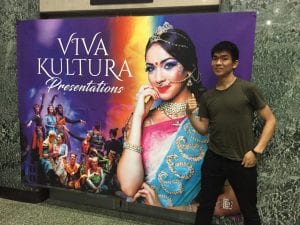
One evening this week, I went to see Viva Kultura, an Indian culture show. In this show, I enjoyed musicals, dances, and the lectures of a monk. All the performances were very sophisticated, and I could drink during the show. In my usual daily life in Japan, it is rare to see cultural aspects of India, except for Indian curry. This event became a good opportunity to be learn more about Indian culture and compare it to that of Japan.
Research Project Update
My research has now entered the final part. Now I can prepare the samples for analysis almost by myself and I want to achieve a good result worth putting in the poster. However, this week, I could not get perfect results. All the results we got from the experiment are determined by the preparation process. In this case, the protein of the objective might have caused mutations because of some errors when I processed it. In order to reach the goal, I had to make the sample preparation process more sophisticated. However, I found that there is not enough time to complete all the experiments because sample preparation and analysis experiments take long time. Therefore, I asked my mentor to allow me to do sample preparation over the weekend. On Saturday, I did it only by myself. I prioritized the safety and completed it.
Another thing I did in this week was to begin to make the poster. In the first part of the week, I made a draft of the poster and asked my mentor to give me some advice. The draft which he recommended to me was completely different from what I had made. In the introduction part I should keep in mind my audience the most when preparing the poster. Thus, I should make the introduction part informative to show that Alzheimer’s disease is a contemporary disorder and make it attractive to those whose majors may be different from my subject.
Week 05: Last Week at Rice Research in the U.S. vs. Research in Japan
Expectations of Research vs. Reality
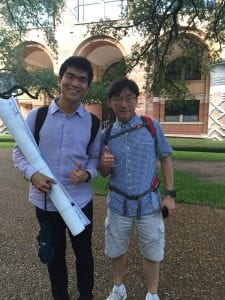
Before I come to the U.S. to do research, I imagined that all the students do the same kinds of research. Actually, in Japan, the department we can belong to is limited to just one in most cases. However, in the U.S. the topics are interdisciplinary, and even within one lab there can be students from many different fields. It is also common at Rice University that one professor belongs to multiple departments. My host professor, Prof. Marti is a professor of both the chemistry and bioengineering department. Thus, even in the same lab, every student has research projects in different fields. My mentor’s research is about the analysis of a protein causing Alzheimer’s disease. On the other hand, there is another group which focuses on materials science in my lab.
In my laboratory in the U.S. the time to work on the project is relatively flexible and different members of the lab came in to work at different times. Because they do analytical measurements in the lab, sometimes they have to stay in the lab very late, but if there is nothing more they have to do that day, they go home around 5 PM. The only moments when they are required to attend was the lab meeting. This is held from 5 PM on Thursdays. What they do in the meeting is different day by day, but mainly the group members will present on the progress of their research in turn. During the presentation other members will often interrupt and ask questions and the professor also makes comments. Even if the field of research varies among students, they share their progress with each other and make sure everyone is catching up on the research in the lab.
My lab in the U.S. also holds birthday parties for all of the members. In my fifth week in Houston, I joined the birthday party of my host professor. We went to a restaurant and enjoyed talking. On that day, my professor‘s wife brought a birthday cake. I found that it is a good aspect of my host lab that they value all of the members and take time to interact with each other.
Through this research experience, I also learned how to deal with the failure and setbacks. In my previous life at my university in Japan, I have not done research yet. Before I came to the U.S., I thought that almost all experiments go well if we conduct it in a theoretically correct way. However, the number of failures I experienced in my experiments were more than my successes. I was sure that the reason why the experiments did not go well exists somewhere in the process of sample preparation. We could come up with many possibilities for the causes, but most of them cannot be detected. In this way, even in the field of science, I often came across situations where we can estimate the causes, but it is difficult to explain the certain reasons for it. I think this experience will be helpful to keep myself from negative feelings towards unexpected research results.
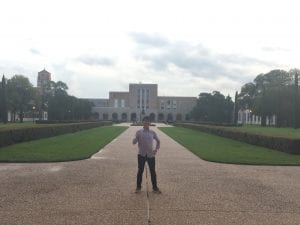
I found that the research is a way to connect different facts and make an algorithm Before I came to the U.S., I prepared for my research by reading the academic papers my mentor sent to me. I felt I could understand what was written in the papers at first. However, through discussion with my mentor, I found that I misunderstood many things. It was especially difficult for me to distinguish the absolute facts and the estimations at that time. In order to understand them more clearly, I took notes and asked my mentor questions. I felt the research was most interesting when I could understand the relation between objectives. From this experience, I learned that I should keep on exploring the research topics and making connections between them.
I liked the university life in the U.S. in that students in different ages are recognized as equal people. So, they can state their opinions clearly to those who are more senior at any time. I think this is the origin of the competitive society of America. In order to become a competent researcher who can work internationally, I think the U.S. provides a better environment to polish myself. At this point, I have not decided if I will apply for graduate course in the U.S., but I hope to come back to the U.S. as a researcher.
Final Week in the Lab
In my final week I Rice University, I monitored the aggregation process of amyloid beta. I had done the experiment one week before, but at that time it did not work. There are many factors which rule the results of my experiment. Among them, my mentor and I thought the pH of the basic solution used to dissolve protein was the dominant cause of failure. The pH was not correct, which made the structure of the dissolved protein unusual. We prepared the solution again and did the same kind of experiment again. However, some proteins showed different results from our expectation. When my final experiment did not go well, I was a little sad. However, Prof. Marti, my host professor, said that 95 % of experiments finish as failures. There are many factors that lead the samples to strange results which is different from theoretical models. Through the series of experiments, one of the biggest things I learned was that most of the things I do in the lab do not finish with our ideal result. However, at the same time I found that this is the interesting point of research. Since there was no precedence, what I did was the first challenge to try this experiment in the world. I wished I could stay in the host lab longer, but this week was my final week there. Therefore, after I go back to Japan, I am going to join a laboratory that has a project related to amyloid beta. The method to analyze it will be different from my lab at Rice University, but I am certain that the viewpoints I learned in my five weeks here will help me in the future.
September 11th was the birthday of Prof. Marti. In the evening of that day, the lab members and I went to a restaurant and held a birthday party. It was the first time for me to go out with the other lab members. The professor’s wife came to bring his birthday cake. Also, one student baked cookies and brought them. We made a birthday card and gave it to our professor. The professor got drunk, and he talked a lot with us. They said that they have a custom to have a birthday party for all of the lab members. I found that this custom of the lab helped make connections between students and professors tight.
Other Seminars and Activities in Houston
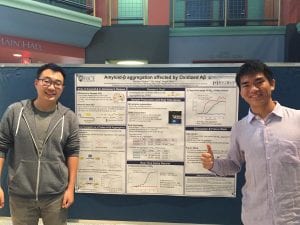
In the beginning of the fifth week, we had a seminar by Dr. Gayle Moran on poster presentation skills. We practiced presenting our research project with our draft posters. We learned how to present our poster to an interdisciplinary audience who may not have background knowledge in our field. In this lecture, one of the most important things was to introduce the research topics and achievements in a short period, called an elevator pitch. Since it was for the first time for me to do a poster presentation, I had difficulty in summarizing my research in ninety seconds. The most difficult thing in practicing my poster presentation was eye contact. I tended to see only one direction when I talked about research, or seeing the letters on the poster. This session helped me see where I needed to improve.
Visiting Texas Medical Center (TMC) Innovation Institute was also an impressive event in the fifth week. It is the facility which supports the entrepreneurship in the medical field. I saw many kinds of medical devices were developed there. This kind of large facility has connections with many other research institutes. Thus, it is relatively easy to exchange samples and information. I think I would be happy if I could incorporate my research in the medical field with this organization.
Research Project Overview and Poster
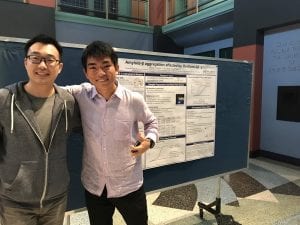
The poster presentation made me nervous. Before I did it, I felt I am not good at speaking in front of audiences. Therefore, I practiced explaining the details of my research. However, I noticed that what most of the visitors want to know was an overview of the research. Also, the poster presentation was not always in one direction. Rather, it is like a conversation. I explained the key points of the project, and I answered their questions. When someone asked questions which were difficult to answer, my mentor helped me to explain it. I was happy that many people I invited came to see my presentation including my lab members, the friends I met at church, and teachers. While I enjoyed the conversations with them, one and a half hour passed very quickly. After finishing it, I was exhausted. It was a little a pity that I could not get presentation award, but I was happy to do my best.
Final Research Poster (PDF): “Amyloid-βaggregation affected by Oxidized Aβ”
Host Lab at Rice University: Angel Martí Group
Host Professor: Prof. Angel Martí, Depts. of Chemistry, Bioengineering, and Materials Science & NanoEngineering
Mentor: Bo Jiang
My research title was “Amyloid-βaggregation affected by Oxidized Aβ”. This research was conducted in Martí group of in the Department of Chemistry. The host professor was Prof. Angel Marti, Associate Professor in the Department of Chemistry and Bioengineering. My mentor was Bo Jiang, a 4th year graduate student from China.
My research is about Altzheimer’s disease (AD) which is an incurable disease occurring in in ageing societies. It is an age-related disease that destroys the brain function. Today, a protein called Amyloid beta (Aβ) is said to be a dominant cause of AD. Aβ exist as monomers in the brains of all people. Monomers are not toxic, but they aggregate to be oligomers and fibrils which cause damage to brain cells. This means that everyone has a potential to suffer from AD. In addition, it is difficult to predict the beginning of the disease. In order to prevent AD from becoming worse, it is necessary to establish a method to detect Aβ.
In previous research, a new family of probes has been developed in the Marti group. They are called metal complexes, chemicals which have both metal atoms and organic ligands. They interact with AB in different stages of aggregation and increase fluorescence, which can be measured by a fluorometer. Among them, there is one special metal complex called Re complex. It can oxidize AB under UV irradiation. Also, it was discovered that Aβ40, one of the family of AB, does not aggregate to be a fibril in the presence of Re complex after UV irradiation. From these two facts, we can establish a hypothesis that Oxidized AB (OXAB) might prevent the aggregation of AB. Thus, my research objective was to investigate the inhibition effect of AB aggregation by OXAB.
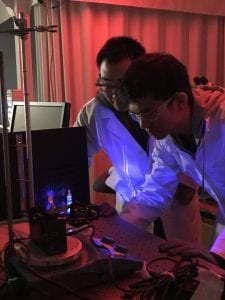
In my five weeks research, I used photochemical analysis methods to monitor Aβ aggregation. The first thing I did was the preparation of samples. I used Aβ purchased from a company. Before I could use it in main measurement, I had to purify it by high performance liquid chromatography (HPLC). After that I used UV-Vis to measure the concentration of AB. When I prepared OXAB, I irradiated UV light on AB in the presence of Re complexes. When I monitored the AB aggregation, I used probe called thioflavin T (ThT) which does not interact with AB monomers, but it interacts with AB fibrils and increase fluorescence. By measuring the change of photoluminescence, I could monitor the aggregation process.
I did two assays about AB aggregation. In the first one, I investigated whether the aggregation of Aβ42, another type of AB, might be prevented in the same way as AB40 showed previously. By preparing the same condition as previous analysis, except the difference of AB40 and AB42. The result showed that AB42 did not show aggregation in the presence of Re complex and UV irradiation, while pure AB42 aggregate as usual. From this result, I understood that AB42 aggregation is prevented by Re complex under UV irradiation as well as that of AB40.
In the second experiment, I determined whether purified OXAB can prevent the aggregation can prevent the AB aggregation. Also, I prepared pure OXAB to determine the aggregation of OXAB. The result was that pure OXAB did not aggregate, but the mixture of AB-OXAB showed more rapid aggregation than any other samples, which contradicted prior results. From these results, I can say that OXAb does not aggregate by itself, but at this point the interaction between AB aggregation and OXAB is still unclear.
For future work, we have to do more experiments to determine the function of OXAB. The number of samples I used for the assay was only five, but I can prepare various combinations of samples. Also, the mechanism that AB aggregation is inhibited is not detected. By combining analytical methods and theoretical one, the detail of the molecular function should be studied.
In the five week research internship, I learned a lot of things. I learned how to use analysis equipment. At first, the only thing I did was to imitate what my mentor said. However, as I used it again and again, I learned the mechanism by which it can measure the quantitative data of chemicals. In the research, there were both successful experiments and those which finished as failures. The biggest thing I learned in this program was the importance of perseverance. Even if I cannot reach satisfying result, I will never lose my curiosity toward natural phenomena and the application of it toward the real world.
Week 06: Last Week in the U.S.

Chihiro has a friend in Philadelphia and on our free sight-seeing day there, we did explored the city with him. In Philly, I was happy to see the statue of Rocky in front of the art museum. I took a photo with it by doing the same pose. We also visited the Magic Garden and I enjoyed the decorated courtyard there. I found it beautiful even though the decorations were made of garbage like discarded bottles and used dishes. In the evening, I went up to the highest floor of One Liberty Observation Deck. There, we enjoyed the scenery of the city. As the time became late, the city got illuminated. I was happy to see the beautiful night view.
Lehigh University, which we also visited in the final week, is a private university which is located in mountainous area. The buildings looked relatively old, but they are elegant. When I explored the campus, I was surprised that there were many libraries in the university. In each library, students were studying from the early morning. The most impressive moment at Lehigh to was getting to have lunch with Prof. Susan Perry. She is a bioengineering professor and her research focuses on the electrodynamics of nerve cells. She has a background not only in biology, but also physics and chemistry. Her interests have changed many times since she became a university student, and she changed her major several times. She told me that if we find out something interesting from our current studies, you do not have to stay in the same place where you are now.
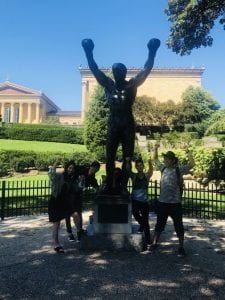
In Washington, D.C., I found the tour in Library of Congress the most impressive. It is not only a facility that has a lot of books, but also one with various artifacts as their components of the building. The inside of the building is filled with sculptures and paintings. It was surprising that all the artifacts have an important meaning related to the history of the U.S. and the history of science. Previously I thought that a library was a place to study and read books. However, I learned many thingsn from the building itself and found I could have spent the whole day here.
One day, we visited the National Science Foundation (NSF) in Virginia. It is a government agency that provides funding via competitive research grants to researchers working in the U.S. Research grants from the are not limited just to U.S. citizens. All we have to do to be eligible to receive a grant from the NSF, is to be employed as a professor at a university in the U.S. I found it a nice system that provide many people with a chance to do research in field of science since the professors they fund can hire any graduate student, U.S. or international, to work on their research projects.
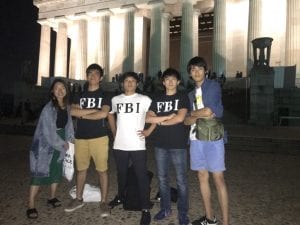
I found that Washington D.C. has so many places to see that it was impossible to visit all of them in just a few days. Around the National Mall, I visited several memorial sights, such as the Martin Luther King Jr. Memorial, Franklin Roosevelt Memorial, Jefferson Memorial, and the Lincoln Memorial. I also visited two of Smithsonian Museums, the National Museum of the American Indian and the National Gallery of Art. They featured the cultural aspects of the U.S. I was happy that I could not only conduct scientific research but broadened my liberal arts in the U.S. When I come back to Washington D.C., I will visit the rest of the museums I did not have the chance to visit. My final event in the U.S. was the night bus tour. I got on the bus near the Capitol, and visited many sights in the city. Because the city is lit up in the evening, it looked different from the day time. I stopped by at the Lincoln Memorial. The statue was lit up, which heightened the respectfulness of the statue.
I think that our five weeks of research in Houston and one week stay on the East Coast was too short for me. In such a short period, however, the 2018 Nakatani RIES Fellowship gave me new friends, knowledge, and skills. I felt it was a pity to go back to Japan. If I say there is nothing I haven’t done in the U.S., it would be not true. I wanted to stay in Washington D.C. to explore the city more. I wanted to do more research at Rice. I wanted to eat more Tex-Mex. I will miss museums in Houston and I wanted to stay in Washington D.C. to explore the city and see all of the Smithsonian museums. I am proud of what I acquired in the U.S. I could meet many friends who are much more intelligent and humorous than me.
Now I am sure that the skills and the knowledge I learned in the lab will no doubt help me do research in Japan. This experience strongly has motivated me about my research project I will start next semester. I learned that everything in research does not go according to plan, like it does in theory. However, I am sure that I can continue forward with research, staying motivated and positive. After studying hard and experiencing many things in Japan, I will come back to the U.S. in the future.
Final Report
I would like to tell the Nakatani Foundation and future participants of Nakatani RIES that, throught his program, I learned the importance of networking with various people. If we spend time in only our home university, we meet people who have relatively similar ways of thinking. In the 2018 Nakatani RIES program, on the other hand, I met many people in a short period of time. There were lab members from different countries. Other Japanese Fellows that are majoring different subjects, and they knew about thinks that I did not know very much about. Also, I had the chance to meet graduate students from Japan who are studying in the U.S. and talk with them about the difference between Japanese education and that of the U.S. Before I participated in this program, I had not imagined the possibility to take a Ph.D. in the U.S. Now, however, I think that I can polish myself more through graduate student and research in the U.S. From my next semester in Japan, I would like to begin my research and always be conscious about my plan to pursue a Ph.D. in the U.S.
I would like to tell my family that my future career is not limited to Japan. In my family, there is no one who has done academic research in foreign countries, and they do not know the fascinating points about studying abroad. It is necessary to remove their misunderstandings about graduate study in the U.S. They might think that it requires a lot of money to study in the U.S. for a long period, like I thought about it before. However, I can receive salary from the university if I work as a researcher during my Ph.D. course. Also, they might imagine that the career of Ph.D. students is limited to academia. In reality, I can say I now know many Ph.D. students who were planning to work in industry. I will propose that studying abroad will be a practical way to broaden my options.
I would like to tell a professor that it is necessary to send students abroad. Because the majority of STEM students proceed to master’s courses, Japanese students tend to go in the same way as others. However, there are many chances where I could learn academic subjects practically in the U.S. Many students in Japan do not know of this opportunity. I am going to spread information on this program to those around me. I am happy if I can share with a professor the appeal and fascination of Nakatani RIES so that they spread information on it to students in my department.
In the U.S., I learned that we should not limit ourselves to just one place to live in to our home country. At Rice University, I met many professors and students, who were born in other countries. The workplace in the U.S. is different from other countries. Thus, we have chance to find better places to live. In order to select the place to work, I think it is necessary to acquire flexibility to adapt ourselves to many places worldwide.
Before I participated in Nakatani RIES, I thought all I had to do was to follow what a professor said to me in my bachelor’s degree. However, in my lab in the U.S., I learned that I have to keep on finding what is required by myself. In my lab at Rice University, I learned several kinds of methods to manipulate photochemical analysis. At first I learned only the process of manipulation. However, I noticed that I cannot apply what I learned to other research if I did not understand the meaning of each process. Thus, I tried to understand the physical mechanism of the equipment. Also, from my experience in this analytical chemistry laboratory, I got interested in not only in analytical methods but also computer simulations of molecular dynamics. I asked about it to the graduate students of the lab and got some tips on it. Even after I go back to Japan, I will never forget this attitude and keep on exploring what I need.
For the future participants in Nakatani RIES, I would like to leave a message that it is important to have passion. Actually, what we could do in only five weeks may only be to follow the instructions of our mentors. However, there must be something you can do by yourselves. If you are selected as the next participant of Nakatani RIES, always be aggressive. If you show your eagerness to your mentor and your host professor at Rice University, they will have higher expectations for you. Also, you should ask as many questions as possible to your mentor. Asking questions will enable you to find out the connections between your fragmented knowledge.
Final Question of the Week
What is the most important thing as a researcher in the U.S.?
- This is a question that you should ask to every professor, researcher, and student that you will meet as I think there may be a million different ways to answer this question.
- Prof. Riichiro Saito from Tohoku University often tells the U.S. students that the greatest thing needed to become a researcher is curiosity. That even in the face of unexpected results or ‘failures’, if you can remain curious about what did/did not happen that is the key that tells you ‘Yes, I am a researcher.”
- If we can remain curious about all aspects of life, it may lead us to new and unexpected questions that may lead to even better results that we could have first imagined. I really liked his words and I often encourage students to always remain curious about the people they meet, their research, their work, and everything they experience in life.
Tips for Future Participants
Pre-Departure Tips: The most important thing about pre-departure is to complete all the documents and apply for your J-1 Visa interview as soon as possible. It takes long time to fill out all the questionnaires, and there are some limitations for your reservation of your visa interview. When you are selected as a participant of Nakatani RIES and receive the documents for completing your visa, you should follow the process on the website and finish the application of the visa as soon as possible.
English Language Tips: When you prepare your English skills in Japan, you should take time to talk with native speakers. Your university must have student communities that many exchange students belong to. There are many things you cannot notice about your English speaking by yourself. If you expose yourself in an environment where you have to speak in English with other international students, you will be able to reflect on your English easily.
Tips on Doing Research: While you are doing research, you should show eagerness to the professor and your mentor. The most efficient way is to ask questions. If you are curious and ask them about their research, they will notice that you are highly motivated to do research. Then they will teach you in earnest.
Follow-on Project: I would like to share the Nakatani RIES Fellowship with more students in my university. Actually, there are many students who are eager to polish themselves in foreign countries, but most of them do not know about the program. Fortunately, in my home university, there is a monthly event in which students talk about their experience in study abroad programs. I would like to contact this office to allow me to talk about the experience of Nakatani RIES there.
